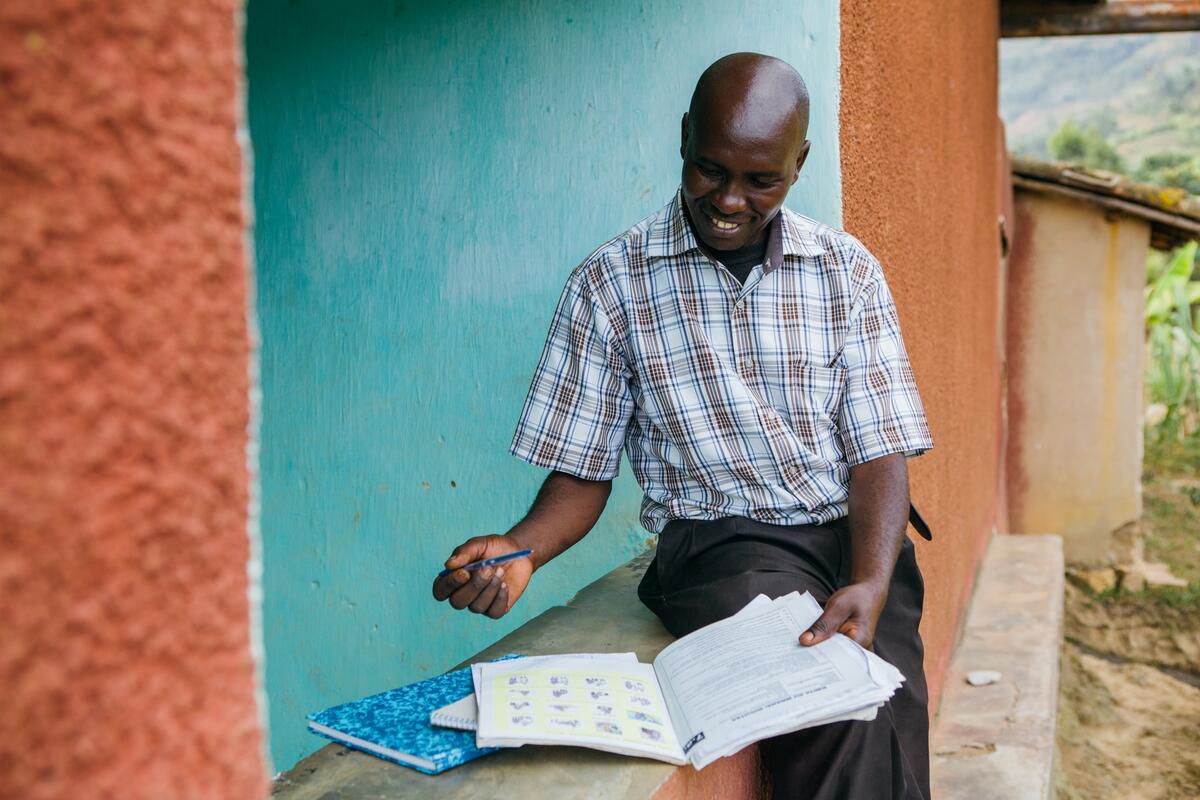How IRC supports the Isoko y'Ubuzima project with its proven tools and approaches.
Published on: 07/04/2023

Rulindo, Rwanda, 2018. Credit: Isoko y'Ubuzima, Water For People Rwanda
A consortium led by Water For People is implementing the 5-year USAID-funded project Isoko y’Ubuzima (2021-2026). It aims to improve water services for 200,000 and sanitation services for 100,000 people in 10 districts. Other members of the consortium are IRC, Vitens Evides International (VEI), CARE International, and African Evangelistic Enterprise (AEE).
The Isoko y’Ubuzima project builds on the achievements of the USAID-funded programme called Isuku Iwacu. From 2016-2020 Isuku Iwacu increased access to basic sanitation and hygienic latrines for respectively 500,000 and 250,000 people in 8 districts in Rwanda. “Despite this success, challenges such as waterborne diseases remain a reality that threaten the welfare of too many children and too many families”, said Deputy Chief of Party for the Isoku y’Ubizima consortium Bruce Uwonkunda at the launch of Isoko y’Ubuzima on 17 March 2022.
In the new Isoko y’Ubuzima project WASH stakeholders will contribute to the “government target of universal access to water and sanitation services for all Rwandans, and to sustain these services for current and generations to come”, Mr. Uwonkunda explained.
Our role is to work with government staff to support national and local systems strengthening with the help of our proven tools and approaches. Earlier from 2019-2021, under the umbrella of Agenda for Change and with funding from the Vitol Foundation, IRC together with WaterAid and Water For People had helped strengthen national systems by developing Management Information Systems and a customer feedback mechanism.
For the new Isoko y’Ubuzima project, IRC conducts training and workshops on National Agenda Systems Strengthening, finance and Gender Equality and Social Inclusion (GESI) in the WASH sector. IRC offers training courses developed by our WASH Systems Academy.
One of the main lessons learned from the WASH Systems Academy training was that blended learning – a combination of online and face-to-face learning – increases engagement and interaction between participants, which ensures higher completion rates. In online only courses participants get distracted by too many competing priorities.
In 2023 training courses are planned on advocacy (blended learning) and building blocks and finance of sustainable WASH systems. See additional upcoming courses here. Next to that, IRC wishes to connect with two institutions for higher learning and with national networks of young professionals.
The Isoko y'Ubuzima consortium supports continued roll out and follow up of the Sustainable WASH Finance strategy strategy, which was developed as part of a UNICEF consultancy with the Ministry of Infrastructure.
Other activities IRC has contributed to include:
Rwanda has very strong political commitment to WASH and stakeholders maintain a focus on achieving the national determined targets. Still, challenges remain around rural infrastructure management, finance, planning and regulation. To help tackle high non-revenue water and non/partially functional rural WASH systems, a new rural water management model will be developed and tested.
When set up or strengthened, a project preparation unit may be a way to help accelerate implementation of district WASH investment plans by improving the channelling of funds toward decentralised needs. Improving sector coordination and communication, including a revised approach to national thematic working groups could help to depoliticise tariff reforms. These issues will be areas of focus in the coming years.
The Isoko y'Ubuzima project, implemented by a consortium led by Water For People with support from IRC and other partners, aims to improve water and sanitation services for 200,000 and 100,000 people respectively in 10 districts in Rwanda. IRC's role is to work with government staff to strengthen national and local WASH systems using proven tools and approaches, including training courses developed by the WASH Systems Academy. Despite Rwanda's strong political commitment to WASH, challenges remain, and the project is developing new solutions for rural infrastructure management, finance, planning, and regulation. With continued efforts from all stakeholders, the project can contribute to achieving the government's target of universal access to water and sanitation services for all Rwandans, and to sustain these services for current and future generations.
Acknowledgements: This news item was reviewed by Angela Huston and Vera van der Grift, and copy-edited by Tettje van Daalen. ChatGPT provided the summary.
With the WASH Systems Academy's free dynamic online courses, everyone can learn what it takes to deliver resilient water and sanitation services and be part of the change needed to leave no one behind. For more information including an overview of all our free courses go to: www.ircwash.org/wash-systems-academy
Isoko y’Ubuzima is a 5-year USAID-funded project implemented from July 2021 through July 2026 by a consortium led by Water For People to improve WASH service delivery. Other members of the consortium are IRC, Vitens Evides International (VEI), CARE International, and African Evangelistic Enterprise (AEE).
Isoko y’Ubuzima has a budget of $21,000,000 to channel the consortium experience in working closely with national and district governments, the private sector, communities, and realize improved water access for 100,000 Rwandans.
The implementation follows the District Wide Approach that was approved by the Ministry of Infrastructure and piloted in 5 districts, to ensure sustainable access to clean water for everyone. The District Wide Approach was born out of Water For People’s Everyone Forever Model, which seeks to bring sustainable WASH services to every community, school, and clinic in a district.
Currently, the approach is being rolled out to sustain major achievements under Isuku Iwacu, a USAID-funded programme that was implemented by Water For People and SNV from 2016-2020.
Isoko y’Ubuzima will provide technical and financial support for the Government of Rwanda through 3 major strategic objectives which are:
For more information visit: rwanda.waterforpeople.org/isoko-yubuzima/
